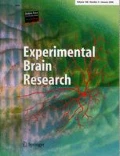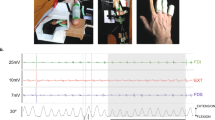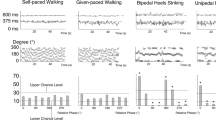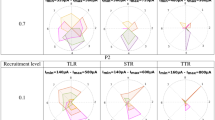Abstract.
This study examines the impact of peripheral nerve block, that is, the elimination of tactile feedback on synchronization performance. In a tapping experiment in which subjects were instructed to tap in synchrony with an auditory pacing signal, three different tasks were studied under conditions with and without peripheral nerve block: standard tapping with tactile contact, isometric tapping, and contact-free tapping. In addition, the maximum tapping rate was registered both with and without peripheral nerve block. It was found that the anticipatory error, usually observed in synchronization tasks, was affected by the peripheral nerve block in the standard tapping and the isometric tapping task. In both tasks, local anesthesia led to an increase in asynchrony between the pacing signal and the tap. Performance remained unimpaired in those tasks in which tactile information was assumed to play a minor role (maximum tapping rate and contact-free tapping). The results clearly demonstrate the importance of tactile feedback for the timing of movements. The predictions of a model assuming a strong correlation between the amount of sensory feedback and the size of the negative asynchrony in synchronization tasks were examined and discussed.
Similar content being viewed by others
Author information
Authors and Affiliations
Additional information
Electronic Publication
Rights and permissions
About this article
Cite this article
Aschersleben, G., Gehrke, J. & Prinz, W. Tapping with peripheral nerve block. Exp Brain Res 136, 331–339 (2001). https://doi.org/10.1007/s002210000562
Received:
Accepted:
Issue Date:
DOI: https://doi.org/10.1007/s002210000562




